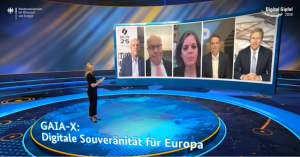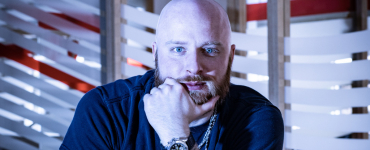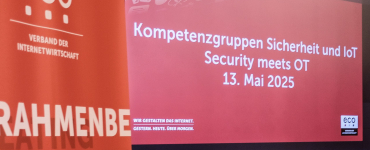- eco’s Alliance for the Strengthening of Digital Infrastructures contributes film at the Summit on sustainable digitalisation locations
- eco Chair Oliver Süme in interview on German television on the potential of digitalisation for more sustainability
- eco and DE-CIX CEO Harald A. Summa in discussion with German Federal Minister of Economics Peter Altmaier on GAIA-X and digital sovereignty
- AI standardisation roadmap: eco Managing Director Alexander Rabe, as member of the DIN Steering Group, calls for future-oriented European standards for AI
This year’s German Digital Summit, organised by the German federal government, has brought together two mega-topics of our time – sustainability and digitalisation – under the motto of “More Sustainability by Means of Digitalisation”.
“Digitalisation and sustainability are two sides of the same coin,” said eco Chair Oliver Süme during a TV interview with the German TV channel Phoenix on 1 December 2020, the main day of the Summit. Digital technologies and services are part of the solution to urgent global challenges such as the climate crisis. According to Süme, this leverage is particularly visible in the context of the Covid-19 pandemic and the enormous amounts of CO2 that are being saved purely by increasing the number of people working from home.
A recent Greenpeace study calculates that just one work-from-home day per week could save 1.6 million tons of CO2 annually.
The sustainability potential of digitalisation has also been the focus of the Alliance for the Strengthening of Digital Infrastructures, founded under the umbrella of eco. Because one thing is clear: Digitalisation requires powerful digital infrastructures in the form of data centres, edge computing, and cloud services. The digital infrastructure ecosystem needs energy for the transfer, storage and processing of data. In Germany, in particular, an accelerated energy transition must therefore take place so that CO2 emissions can be reduced even more quickly and the overall eco-balance – which even today is already positive – can be further optimised.
European data centres form the backbone of digitalisation and are already among the most energy-efficient in the world. Nevertheless, further efficiency potentials can be exploited in the future and even more energy saved.
These are the key findings of the recent study “Data Centres in Europe – Opportunities for Sustainable Digitalisation” which the Alliance developed together with the Borderstep Institute and with the support of the Vodafone Institute.
These connections are also illustrated in the information film “Internet locations” (German language), which eco produced for the Digital Summit programme in place of the originally-planned press tour this year, and which was presented on the big screen at the summit.
The GAIA-X project represents best practice for effective European cooperation between providers, users and political decision-makers, and should be used to develop and establish standards and criteria for the sustainability of digital infrastructures and data centres in the future.
During a joint panel discussion with the German Federal Minister of Economics Peter Altmaier and company representatives on the topic of GAIA-X, the CEO of eco and DE-CIX, Harald A. Summa, once again emphasised the importance of this initiative, in which DE-CIX and eco have also been actively involved from day one.
The DIN Steering Group, with the participation of eco Managing Director Alexander Rabe, has been working on the future of trustworthy and reliable AI applications in order to develop the AI standardisation roadmap. With this roadmap, the experts from politics, business and science are implementing a central measure from the German federal government’s AI strategy, and explicitly dedicating themselves to the topic of “setting standards”.
The quintessential message of eco at the Digital Summit “More Sustainability by Means of Digitalisation”, organised by the German federal government, was: Digitalisation holds enormous potential for sustainability and climate protection. The industry is taking its responsibility seriously and is driving forward the development of energy-efficient innovative solutions. It is now up to politics, in close cooperation with the industry, to develop holistic and consistent concepts to fully exploit this potential. For a sustainable digital future.




